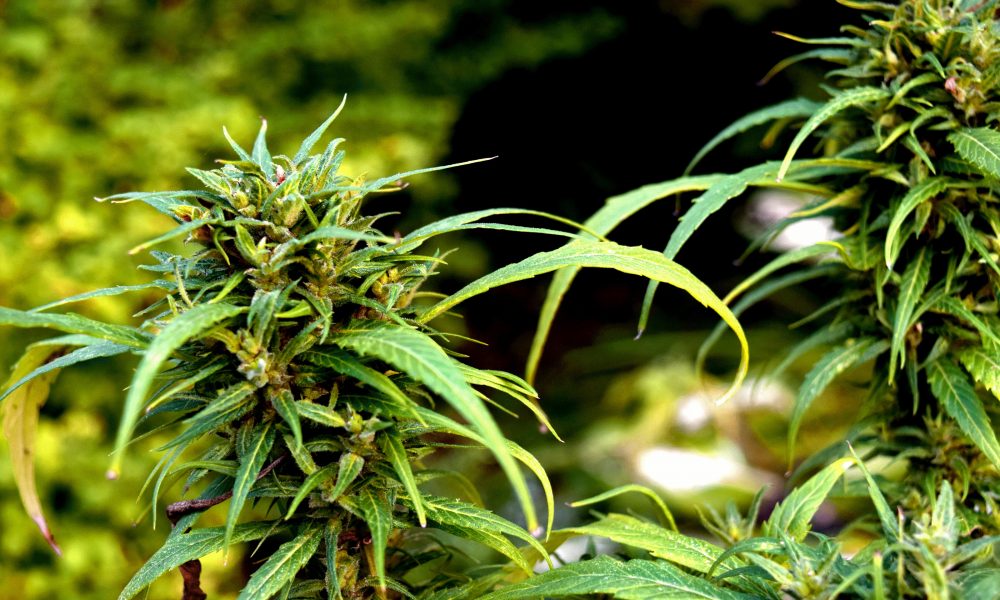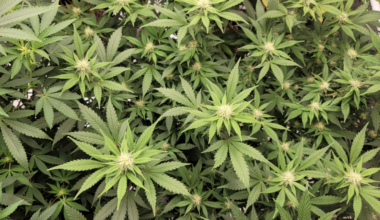Three Kentucky Democrats, including a top party official in the state Senate, have unveiled sweeping bills to end cannabis prohibition by legalizing sales to adults over 21, establishing a medical marijuana program for registered patients and expunging past convictions that the sponsors say never should have been charged in the first place.
Senate Minority Floor Leader Morgan McGarvey , Sen. David Yates and Rep. Rachel Roberts introduced the 74-page legislation on Thursday. A competing Republican-led proposal filed in January would legalize only medical cannabis.
The Democratic sponsors of the new bills said at a press conference that their plan would allow the state to catch up with the 37 others that already allow patients access to medical marijuana, establish a new revenue stream for the state and local governments and free law enforcement to focus on more serious crimes.
“Our legislation is the comprehensive plan that Kentuckians deserve, and it builds on what’s worked in other states while avoiding their mistakes,” Roberts said.
“Kentucky continues to fall behind in an area where we could be leading,” said McGarvey. “It is 2022. It’s time we end the prohibition on cannabis in Kentucky.”
The legislation—SB 186 in the Senate and HB 521 in the House—is dubbed LETT’s Grow, an acronym built of the bills’ main components: Legalizing sales, expunging crimes, treatment through medical use and taxing of adult-use sales.
It would also expand funding for treatment of substance use disorder and earmark a portion of state proceeds for scholarship programs and grants to groups that have been disproportionately impacted by the drug war.
Democrats, who have a minority of seats in both chambers, said at the start of this year’s session that legalization would be a top priority for 2022, calling the policy change long overdue and noting that cannabis reform enjoys bipartisan support among voters in the state—a point sponsors of the new bill echoed on Thursday.
Nothing polls higher or more bipartisan in Kentucky than cannabis legalization. It’s time… L.E.T.T.’s GROW our economy, industry, healthcare options, and new jobs! #lettsgrow #legalize pic.twitter.com/UnreZi9AKI
— Representative Rachel Roberts (@Rachel4KY) February 17, 2022
A poll released in 2020 found that nine out of 10 Kentucky residents support legalizing medical marijuana, and almost 60 percent say cannabis should be legal under “any circumstances.”
Kentucky is already a competitive hemp producer, harvesting about 1,500 acres of the crop last year, according to a new federal study of the hemp industry—more than all but eight other U.S. states.
If passed, the new bill would legalize possession of up to a one ounce of marijuana in public and up to 12 ounces in a private space. Sharing of up to an ounce of cannabis between adults or patients would also be legal. People legally allowed to possess and use cannabis could also grow their own at home, with up to 10 mature marijuana plants per person.
Medical use would be allowed for any medical condition “for which an authorized practitioner believes that a cardholder patient may receive therapeutic or palliative benefit from the use of medical cannabis.”
—
Marijuana Moment is already tracking more than 1,000 cannabis, psychedelics and drug policy bills in state legislatures and Congress this year. Patreon supporters pledging at least $25/month get access to our interactive maps, charts and hearing calendar so they don’t miss any developments.![]()
Learn more about our marijuana bill tracker and become a supporter on Patreon to get access.
—
“Our plan is both comprehensive and caring,” Roberts said of the new Democratic bill. “It helps those who are sick. It gives a second chance to those who shouldn’t have been charged And it would put Kentucky almost overnight at the epicenter of a multibillion-dollar business.”
The competing Republican medical cannabis measure is far more restrictive. Under that proposal, patients would need to have one of several specified qualified conditions, although regulators could add more. Both home cultivation and smoking of cannabis would also remain illegal for patients. And no adult-use whatsoever would be allowed.
While the state’s governor, Andy Beshear, is a Democrat, his initial reaction to the legislation Thursday seemed more aligned with Republicans. He told reporters at a press conference that he supported medical cannabis, but he didn’t comment on adult use.
Late last year Beshear said that “It’s time we joined so many other states in doing the right thing” and added that Kentucky farmers would be well positioned to grow and sell cannabis to other states.
The new plan from the Democratic lawmakers plan leaves many program specifics to regulators, including limits on dosage, potency, overall THC content and packaging.
Overseeing the new industry—and setting rules around not only business behavior but also possession and use—would be a seven-member Cannabis Control Board. The board would license a cannabis cultivators, processors and manufacturers, testing labs, retail stores, special events, social consumption spaces, transporters and any other category deemed necessary by regulators. A separate category of licenses would be created for so-called microbusinesses.
The new bill would also create four standalone advisory committees to advise the board on adult use, medical cannabis, cultivation as well as social and economic equity.
Sales of adult-use cannabis would be taxed at 6 percent at the state level, with municipalities able to add fees of up to 5 percent combined between local jurisdictions. Overall, sales would be taxed at no more than 11 percent, which is lower than most other legal states.
All products would need to carry an advisory label and include basic details including ingredients and additives, net weight, an expiration or use-by date and “labeling that differentiates between medical cannabis products and adult use cannabis products.” Further, all packaging would need to be opaque.
The bill would also forbid employers or professional organizations from discriminating against people who use cannabis off the job provided it does not affect their work performance or compromise safety. Smoking marijuana in public would remain illegal but be punishable by a maximum $100 fine.
Anyone ever convicted of a misdemeanor for possession, delivery or manufacture of cannabis or cannabis-related paraphernalia could petition a court for expungement. The process would happen automatically after a year, although people could petition a court for expungement earlier.
People who’ve been convicted for cannabis “should not be saddled with a criminal record and the lifelong penalties and stigma associated with it,” Yates said. “We have put too many people behind bars for this offense. Our lockups are full of them, and that is both unjust and costly.”
Nearly 7,600 Kentuckians, disproportionately Black people and young people, were arrested in the state in 2018 on cannabis charges, the senator, noting that most of the arrests were for possession.
Meanwhile, McGarvey has posted a series of vides on TikTok that humorously express frustration about Kentucky’s lack of progress on marijuana as other states enact reforms.
@kysenatedems Mississi-pissed off? Speak up🗣🗣Let ‘em know! #kysenatedems #kydems #ky #kentucky #poltics #fyp #foryoupage #medical #legalizeit #decriminalize
The new bills face a difficult path in the Republican-controlled legislature. On the other side of the aisle, even longtime medical cannabis backer Rep. Jason Nemes (R) has added restrictions to past versions of his legislation to make his new bill more appealing to the state’s conservatives.
Nemes in 2020 filed a medical legalization bill that soundly passed the House but later died in the Senate amid the early coronavirus pandemic. He reintroduced the legislation for the 2021 session, but it did not advance.
In recent months, Nemes has been been working to build support for a new, scaled-back version a medical marijuana bill and in October said he was confident it could pass if only legislative leaders have the “courage” to allow a vote on it.
The narrow approach is designed to win support among GOP leaders in the state Senate, who’ve killed past versions of Nemes’s proposal. Senate Floor Leader Damon Thayer (R), for example, steadfastly opposes the change, having warned that it’s a fast track to full legalization.
“I know my constituents are for it,” Thayer, who owns a whiskey distillery, said during a televised panel earlier this year. “But this is a republic, and they elect us to go to Frankfort and make decisions on their behalf—and if they don’t like it, they can take it out on me in the next election.”
Others remain wary, such as House Speaker Pro Tempore David Meade (R), who said at the panel that he was still “on the fence” about medical cannabis.
Meanwhile, another Democratic lawmaker, Rep. Nima Kulkarni, prefiled separate legislation late last year that would legalize possession, limited sales and home cultivation of marijuana.
Medical Disclaimer:
The information provided in these blog posts is intended for general informational and educational purposes only. It is not a substitute for professional medical advice, diagnosis, or treatment. Always seek the advice of your physician or other qualified healthcare provider with any questions you may have regarding a medical condition. The use of any information provided in these blog posts is solely at your own risk. The authors and the website do not recommend or endorse any specific products, treatments, or procedures mentioned. Reliance on any information in these blog posts is solely at your own discretion.







